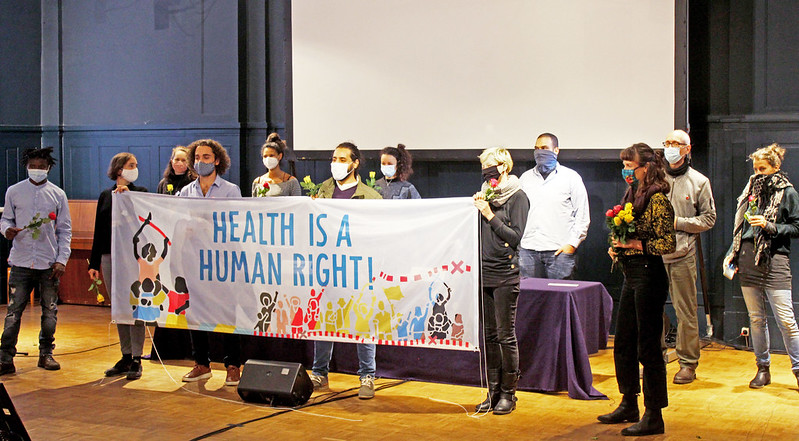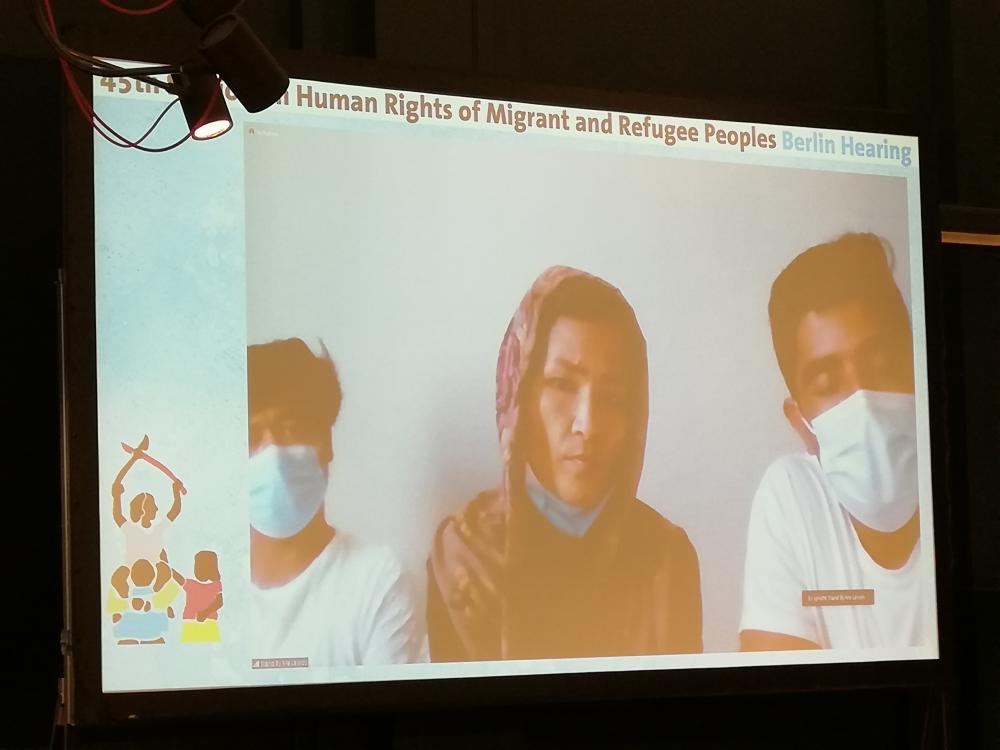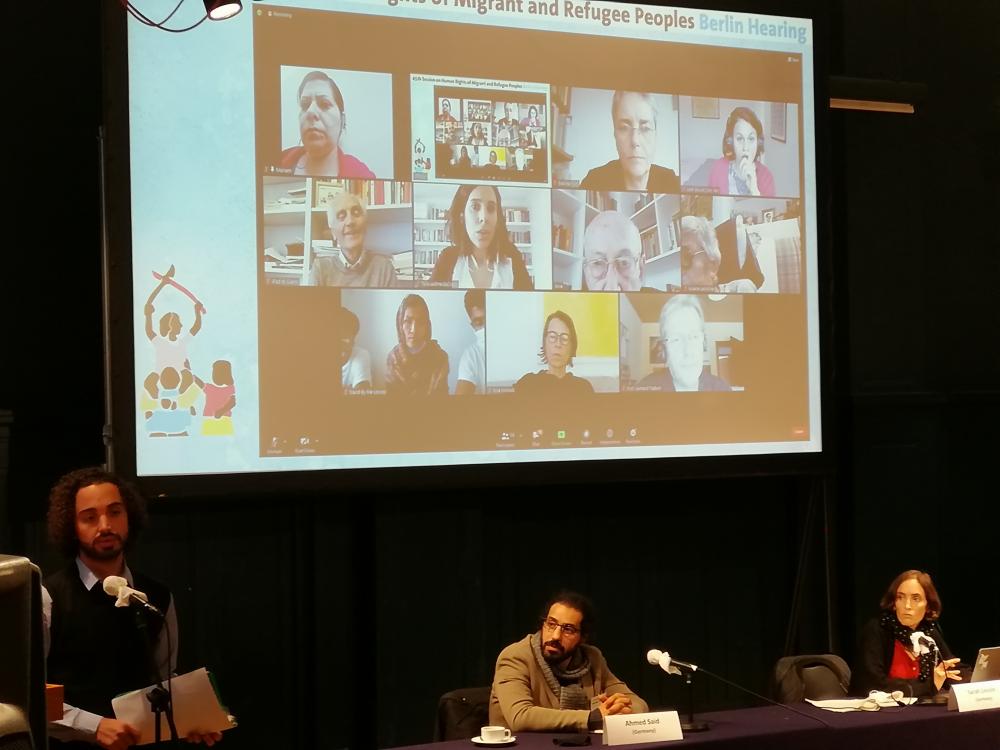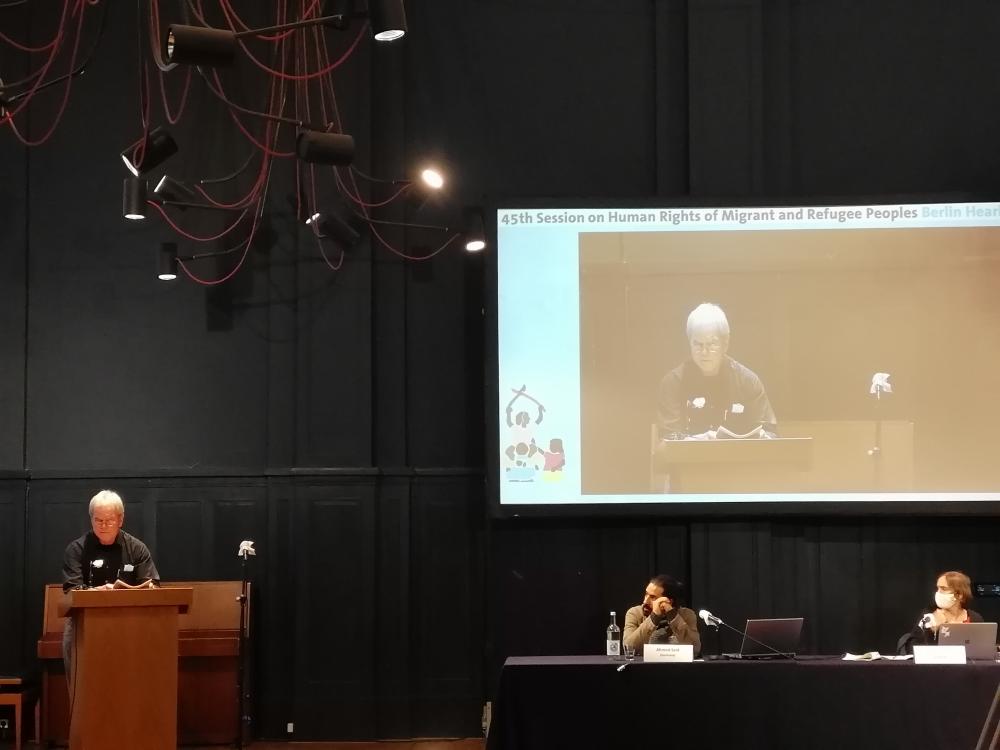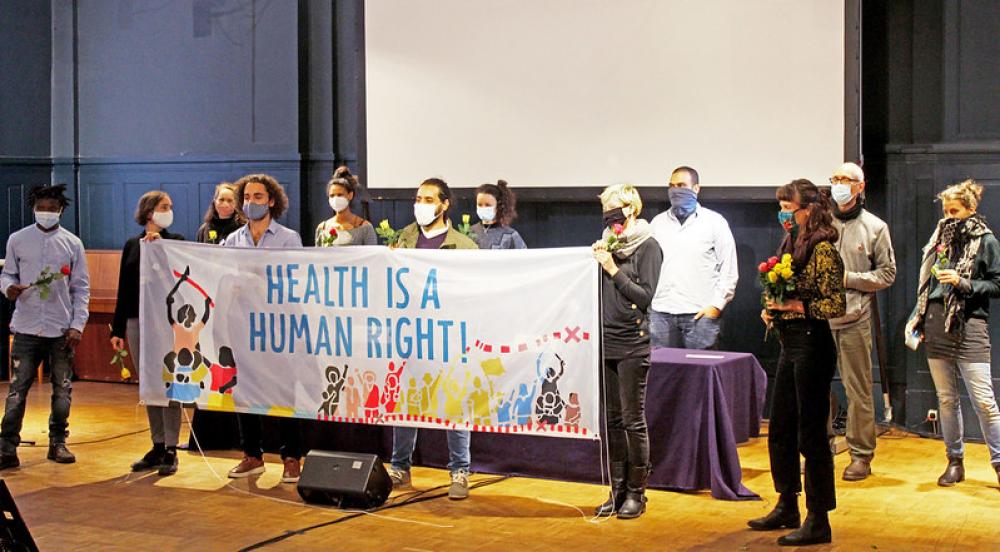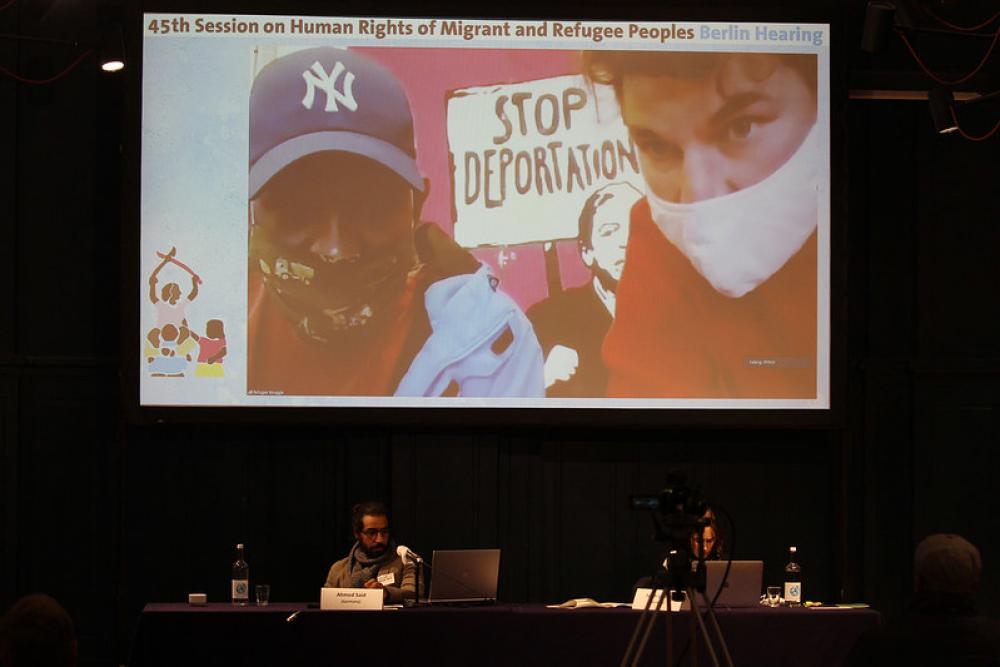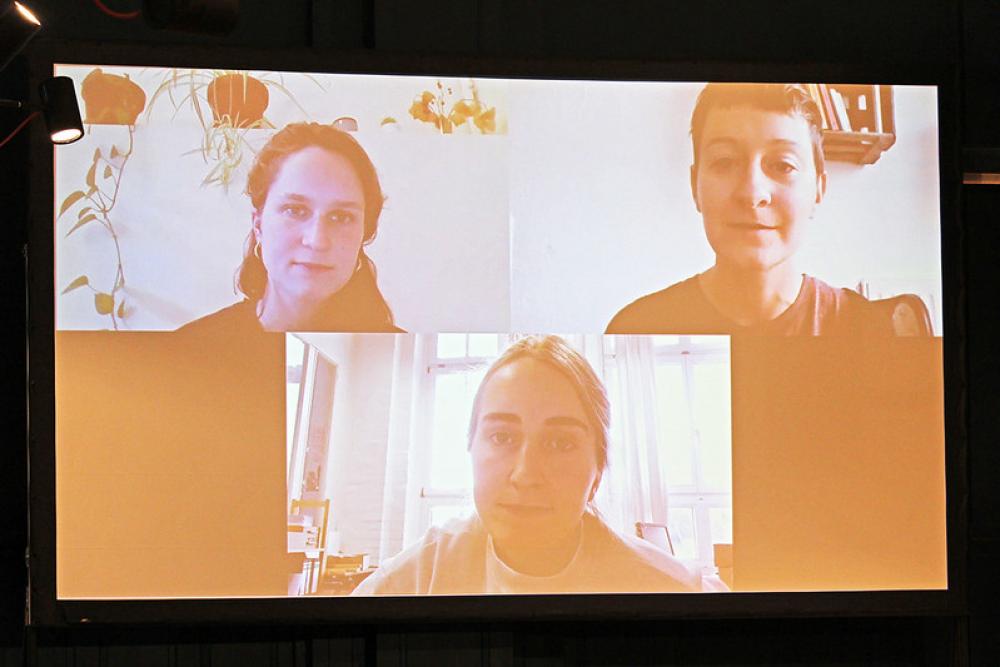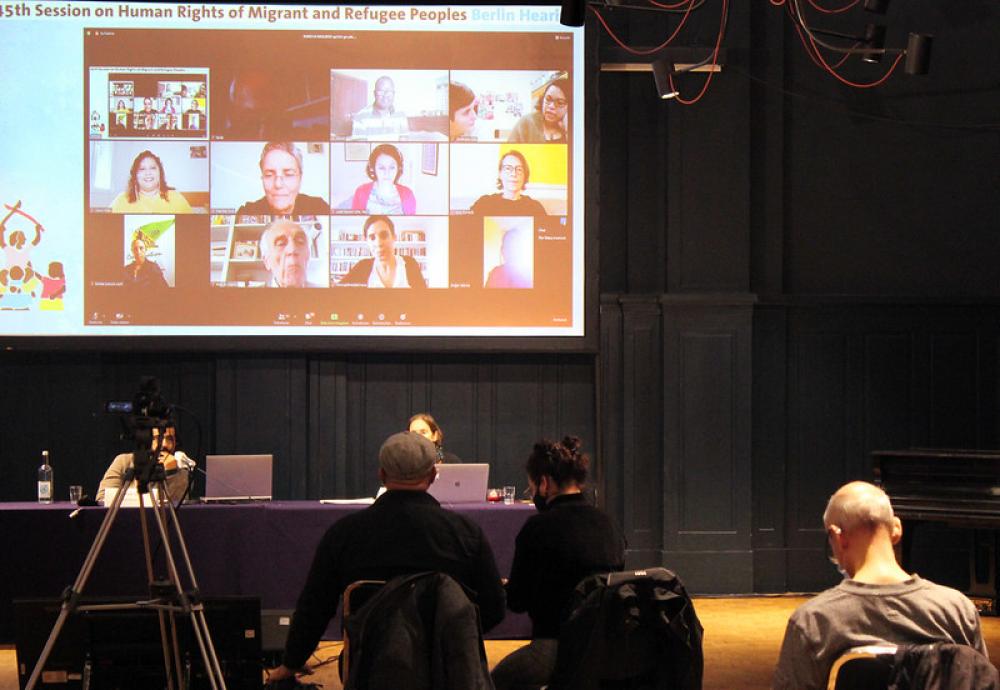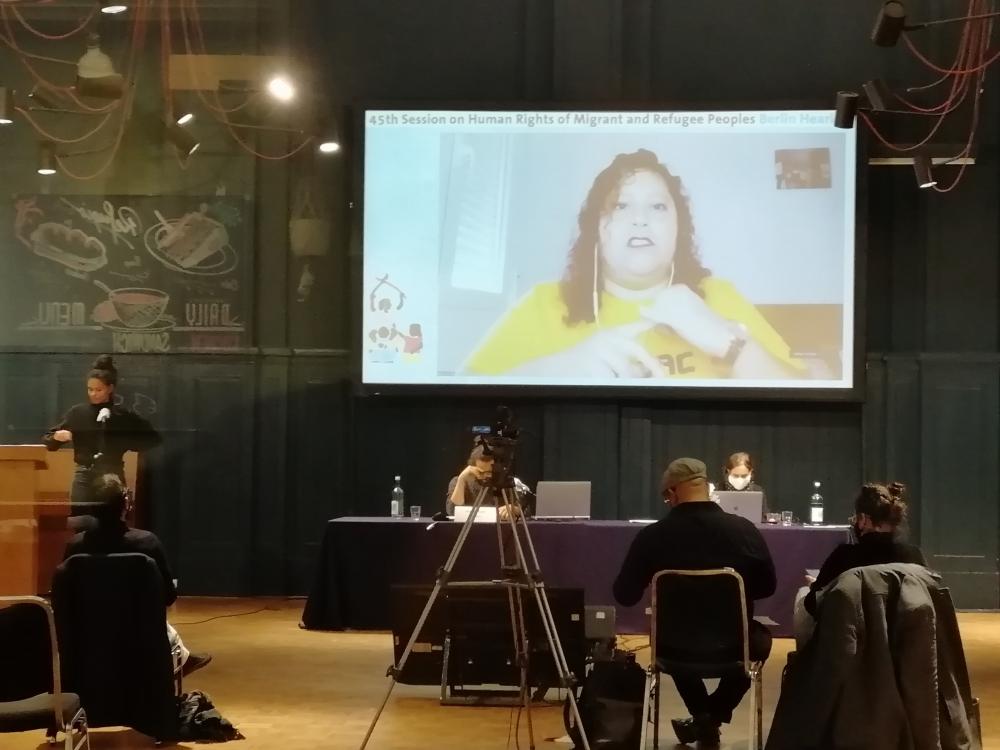45th Session of the PPT on Human Rights of Migrants and Refugee Peoples
The Right to Health
by Julia Türtscher
The Berlin hearing of the 45th session of the Permanent Peoples’ Tribunal on the rights of refugees and migrants took place on October 23-25, 2020. The Permanent Peoples' Tribunal (PPT) looks back on a long history since the first tribunals against human rights violations in the Vietnam War in the 1970s. The 45th session of the PPT was dedicated to human rights violations against refugees and migrants in Europe and had the title"Violations with Impunity of the Human Rights of Migrant and Refugee Peoples".
We were part of the alliance which organized the Civil Human Rights Tribunal, this time focusing on the right to health for migrants and refugees.
The entire event was streamed live and can be found here.
Access to health as a human right
The right to the highest attainable standard of physical and mental health is a human right. As the basis for human dignity, for an adequate standard of living and in close connection with other social rights, the right to health is enshrined in numerous international and national legal documents. However, the current asylum and migration policy of Germany, the EU and its member states continuously denies this right to migrants and refugees in numerous places.
The Tribunal began on Friday with a strong start with the first two thematic blocks being the access to health care in Germany and Europe:
Fatuma Musa of United Action e.V. reported on the importance of information and knowledge, especially for women and girls, to ensure comprehensive health care. Medibüro Berlin and Medinetz Mainz sdescribed the situation of hundreds of thousands of people who have no insurance in Germany due to the discriminatory legal situation and therefore have no or only very limited access to medical care. Karsten Dietze from Handicap International International pointed out the serious shortcomings in the care of refugees with disabilities, especially in identifying the special needs of this vulnerable group. As a consequence of this invisibility, the needs of this vulnerable group are simply not being addressed. LesMigras reported, based on their experience in counselling work, about the multiple mental health burdens faced by LGBTIQ+ people of color and refugees as well as about the barriers they are confronted with when trying to access mental health care.
Lastly, CoraSol talked about demands for integration, which are accompanied by exclusion and racism: "As Blacks, as migrants, we do not have this right to free speech. [...] Your opinion does not count.”
This was followed by reports about the catastrophic situation for people in collective accommodation centrer as well as for undocumented persons in the UK, which was further aggravated by the Covid-19 pandemic, and about the practical obstacles to theoretically given access to the health system in the Netherlands.
Of European borders where health care is irrelevant
The first day ended with a hearing on the EU border policy, in which Philip Ishola for Love146 highlighted the long-term, hurtful effects of discriminatory asylum policies, especially on children and young people. At last, Muhammad al-Kashef of Alarmphonehighlighted the outstanding role Germany plays in the externalization of EU borders by providing material, vehicles, training and funding.
The second day of the hearing began with reports from doctors describing the degrading conditions for refugees on the Greek islands, which were excacerbated by the fire in Moria. Amelia Cooper from the Legal Center Lesvos reported on the traumatic experiences caused by the enormously high rates for refusal of family reunifications in Greece: "These refusals are often based on reasons that are flimsy at best and illegal at worst".
Reporting on their personal experience in the camp were then Sohrab Shirzad, who was left to take care of himself with a broken leg, and Mazoma Rezaie, who was not believed to have epilepsy and was therefore refused treatment.
In another report, Maryam from Stand by me Lesvos described the state of poor health care in Lesvos, the lack of support for people with disabilities and the lack of trust from patients. All of this has a direct impact on the health of those affected. This was also confirmed by the statement from Pikpa Camp, also based in Lesvos. Stress and the mental strain that people are exposed to due to the lack of or refusal to respond to their asylum applications has an impact on both physical and mental illness. At Europe's external borders, the real effects of European policies are particularly evident: "If we are talking about healing and health we must talk about policies - that are against healthy people and that are creating, actually, mental health and health problems.
The role of political decisions was also the focus of the subsequent hearing on the criminalization of solidarity. In borderline-europe's report to the tribunal, the focus was on the targeted blockade of civilian search-and-rescue ships and monitoring and information missions at sea and in the air through criminalization.
"The government must be held accountable"
In the two hearings that followed, the focus was once again directed towards Germany. The hurtful and sickening effects of racism and exclusion became clear in reports by Black Visions and Voices. Adding to the burdensome experience is the fact that, in medical and psychological training, racism-related problems are hardly or not at all dealt with and that people with racist experiences are strongly underrepresented.
Traumatizing experiences with police violence were the central subject of the next testimony. This was followed by the Flüchtlingsrats Berlin's (Berlin Refugee Council's) speech on a particularly shocking case in which a young refugee became victim of a racially-motivated attack. He was subsequently deported to Afghanistan despite special regulations for such cases, despite the ongoing proceedings against the perpetrator and despite his mental illness resulting from the traumatizing attack. The Initiative zum Gedenken an Oury Jalloh (initiative for the commemoration of Oury Jalloh) also presented the chronology of the death of Oury Jalloh, who was burned to death in a prison cell in Dessau in 2005 and whose death has only been clarified very fragmentaritly and dubiosly up until today.
The effects of German asylum policy on the health of migrants and refugees were also the focus of the afternoon of the second day of hearings. In several reports, among others from Mecklenburg-Vorpommern and Bavaria, those affected reported on the enormously stressful living conditions in mass accommodations. They described open conflicts, the violation of privacy through unauthorized access to rooms and the fundamentally inappropriate type of accommodation for children. Guillermo Thompson, who tried to capture the conditions with videos, was repeatedly exposed to repression. In his statement he demanded: "The government must be held accountable! - For all who fled. They have the right to migrate. To be safe."
Then, the group Monitoring of Deportations at Airports from North Rhine-Westphalia, after a short report on the general situation, described two case studies of deportations in which the persons concerned in both cases were, despite their extremely poor state of health, classified as "fit to travel" – and thus as fit for deportation. In one of the two cases, the person had attempted suicide on the day of deportation. After the wounds had been dressed, the person concerned was deported to Afghanistan.
Finally, the last hearing of the Berlin session was dedicated to the situation of migrant workers, whose situation was further aggravated this year, especially by the pandemic. Angie García from Waling Waling gave insight on this from the perspective of mostly female, domestic migrant workers in the UK. Carolina Elías reported on the same topic for SEDOACfrom Spain. Emilie Loison from La Confédération de Paysanne du Morbihan and a representative of the SOC-SAT union in Almería reported on the harsh working and living conditions for female workers in agriculture and the resulting policy of illegalization. Finally, Giulia Trattarini of Berlin Migrant Strikers presented a statement by ALSO Oldenburg on the situation of migrant workers in Germany.
A provisional conclusion
Sunday morning began with an input panel on the planned new EU migration pact, according to which the sealing off and militarization of the European borders are only to be taken to a further level. At the end of the Berlin hearing, short, preliminary statements by the panel members followed, in which they referred to the reports and statements of the previous two days.
"The reports of refugees and their supporters paint a frightening picture of German and European migration policy," summarized jury member Sarah Lincoln, for example. "Many refugees are sick and need special protection. Instead, they are treated like second-class citizens, without privacy, without access to adequate health care, without procedural rights".
The verdict of the jury of nine scientists, journalists, doctors and lawyers was announced on 16 December 2020. The full verdict can be read here: https://equalhealth4all.noblogs.org/de/verdict/.
Related links:
- Verdict: https://ppt.transnationalmigrantplatform.net/berlin-in-2020/permanent-peoples-tribunal-berlin-hearing-indictment-on-migration-and-the-right-to-health/
- Blog of the Berlin PPT hearing: https://equalhealth4all.noblogs.org/
- Program: https://equalhealth4all.noblogs.org/files/2020/10/Program.pdf
- Youtube-Channel: https://www.youtube.com/channel/UCqiGmyGQ9vuBVJfSDTVah0w
- Photos: Bildarchiv 45. Sitzung des PPTs zu den Rechten von Geflüchteten und Migrant*innen in Berlin
- 4th episode of the PPT podcast "The Right to Health" with borderline-europe: "Warum das EU-Grenzregime krank macht und wie Migration & Solidarität kriminalisiert werden"
December 28, 2020

